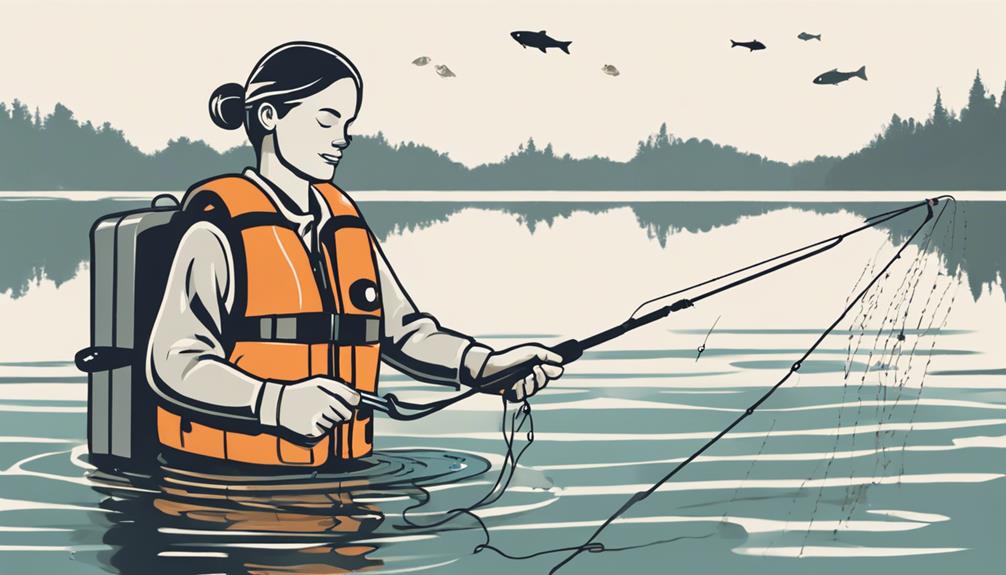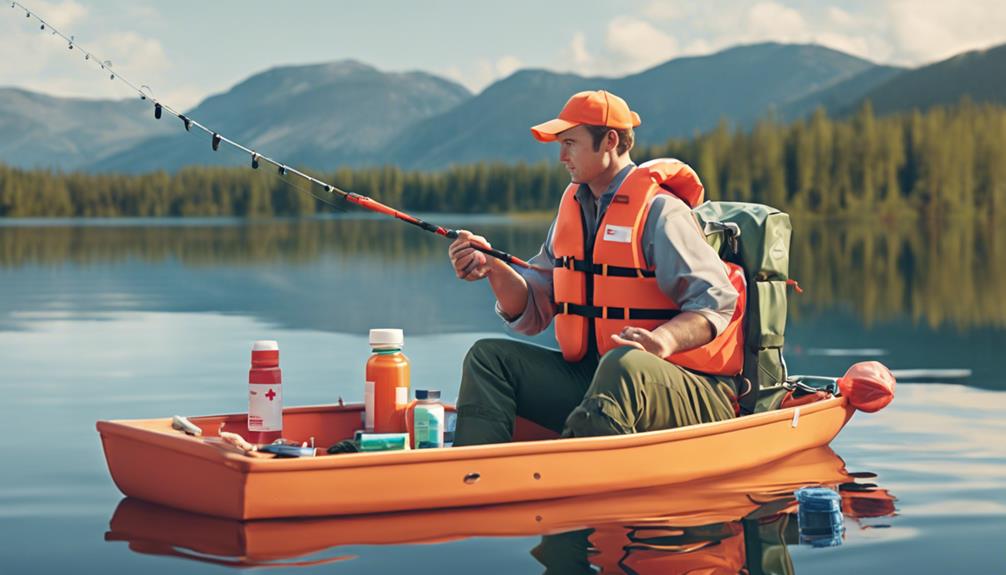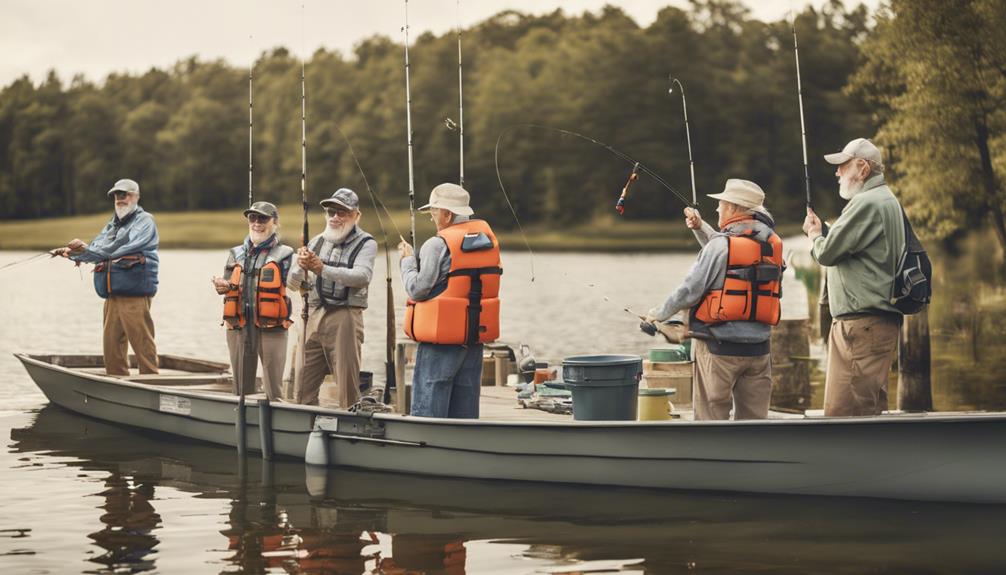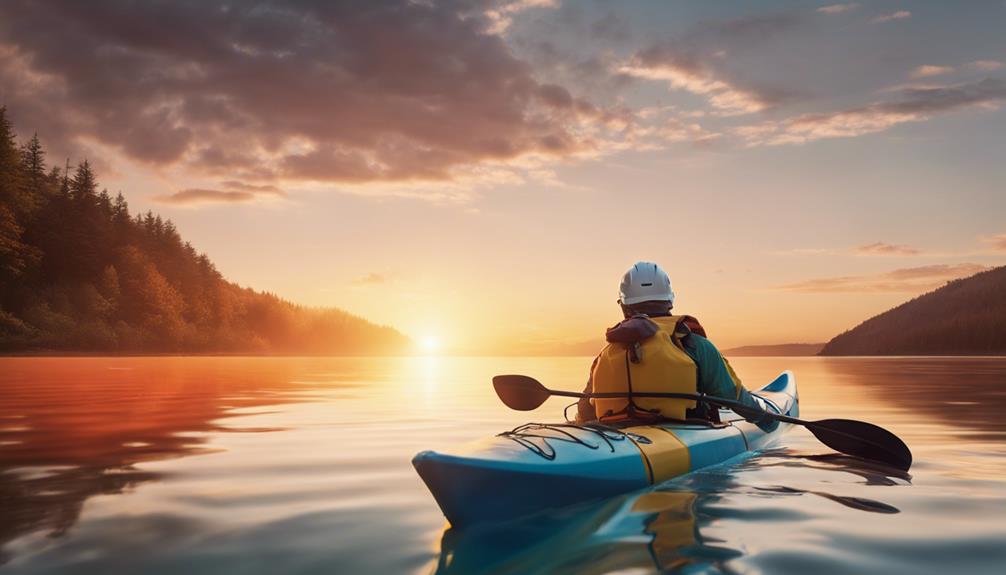When it comes to ensuring your safety while fishing, casting your line into the water is just the tip of the iceberg.
Five key steps can make all the difference in your angling experience. From selecting the right gear to navigating local regulations, each aspect plays a crucial role in safeguarding not only yourself but also the environment.
Stay tuned to discover how these steps can enhance your fishing adventures and elevate your angling skills to the next level.
Importance of Proper Gear
To ensure your safety while fishing, using the correct gear is essential. Choosing the right equipment can make a significant difference in your fishing experience. When selecting your gear, consider the type of fish you plan to catch, the location you'll be fishing in, and the techniques you'll be using. Make sure to match your rod, reel, and line to the specific requirements of your fishing trip. Proper maintenance techniques are also crucial in ensuring your gear functions correctly and safely.
When choosing the right equipment, make sure to inspect your gear regularly for any signs of wear and tear. Check your rods for any cracks or damage, your reels for smooth operation, and your lines for fraying or weak spots. It's essential to clean your gear after each use to prevent dirt and debris from causing damage. Reel lubrication, rod cleaning, and line inspection should be part of your routine maintenance.
Proper maintenance techniques not only extend the lifespan of your fishing gear but also help prevent accidents. A well-maintained rod and reel are less likely to fail when you're reeling in a big catch. By taking the time to choose the right equipment and maintaining it properly, you can ensure a safe and enjoyable fishing experience.
Understanding Water Conditions
Choosing the right gear is crucial for safe fishing, and an important aspect to consider next is understanding water conditions. Before heading out, conduct a current analysis to determine the flow and direction of the water. This information can help you avoid potential hazards and ensure a safer fishing experience. Additionally, always take safety precautions, such as wearing a life jacket, especially in areas with strong currents.
Weather awareness is another key factor when it comes to understanding water conditions. Keep an eye on the weather forecast before your fishing trip to prepare for any changes that may occur. Sudden storms or heavy rainfall can lead to rising water levels and fast-moving currents, increasing the risks involved.
Hazard assessment is essential in ensuring your safety. Be aware of any potential dangers in the water, such as submerged rocks, strong undertows, or sudden drop-offs.
Practicing Safe Casting Techniques
Using proper casting techniques is essential for ensuring your safety while fishing. By improving accuracy and preventing injuries, you can make your fishing experience both enjoyable and safe. Here are some key tips to help you practice safe casting techniques:
- Maintain Proper Spacing: Ensure there's ample space around you before casting to prevent accidentally hooking yourself or others.
- Use the Right Equipment: Select the appropriate rod and lure for the type of fishing you're doing to improve your accuracy and reduce the risk of injuries.
- Mind Your Surroundings: Be aware of obstacles like trees, rocks, or other fishermen to avoid getting tangled or causing harm to yourself or others.
- Practice Your Technique: Regularly practice your casting to improve your accuracy and avoid sudden movements that can lead to injuries.
- Wear Eye Protection: Invest in a good pair of polarized sunglasses to shield your eyes from any potential accidents while casting.
Following these safe casting techniques won't only enhance your fishing skills but also contribute to a safer fishing environment for everyone involved.
Knowledge of Local Regulations
Ensure you familiarize yourself with the local fishing regulations to fish responsibly and legally in the area. Understanding boundaries and conservation awareness are crucial aspects of practicing safe fishing. By knowing the rules and guidelines set by local authorities, you not only protect the environment but also contribute to sustainable fishing practices.
Understanding boundaries is essential to respect protected areas and ensure you aren't fishing in prohibited zones. These boundaries are established to safeguard vulnerable ecosystems, breeding grounds, and endangered species. Ignoring these boundaries can have detrimental effects on the local environment and disrupt the natural balance of marine life. By adhering to these restrictions, you play a vital role in preserving the biodiversity of the area.
Conservation awareness involves being mindful of catch limits, size restrictions, and prohibited species. It's important to understand the impact of overfishing and the significance of allowing fish populations to replenish. By following these regulations, you help maintain healthy fish stocks and support the long-term sustainability of marine ecosystems. Additionally, respecting catch limits prevents excessive fishing pressure, which can lead to depletion of fish populations.
Handling Fish With Care
Handle fish with care to ensure their well-being and your safety while fishing. Proper handling techniques not only benefit the fish but also contribute to the preservation of the aquatic ecosystem. When catching and releasing fish, it's crucial to follow ethical practices to minimize harm and maximize their chances of survival.
Tips for Proper Handling and Ethical Release:
- Minimize Air Exposure: Keep the fish in the water as much as possible to prevent stress and reduce the risk of injury.
- Use Barbless Hooks: Barbless hooks are easier to remove, causing less damage to the fish's mouth and increasing the likelihood of a successful release.
- Avoid Dropping: Handle the fish gently and avoid dropping them, which can lead to internal injuries.
- Support the Fish Properly: When holding the fish, support its weight evenly to prevent unnecessary strain or injury.
- Revive Before Release: If the fish appears exhausted after the fight, gently move it back and forth in the water to help oxygen flow through its gills before letting it swim away.
Sun Protection and Hydration
Proper sun protection and hydration are essential for maintaining your health and well-being while fishing. When spending long hours out on the water, it's crucial to safeguard yourself against the sun's harmful rays and stay adequately hydrated. Here are some sun safety and hydration tips to help you enjoy a safe fishing experience.
First and foremost, always wear sunscreen with a high SPF to shield your skin from sunburn and potential long-term damage. Reapply sunscreen every few hours, especially if you're sweating or in and out of the water. Wearing a wide-brimmed hat and UV-protective clothing can also provide extra protection.
In addition to sun protection, staying hydrated is key to preventing heat-related illnesses. Remember to drink plenty of water throughout the day, even if you don't feel thirsty. Dehydration can sneak up on you, so it's essential to keep sipping water regularly. Consider bringing a reusable water bottle to have easy access to hydration while fishing.
To maintain your energy levels and focus, snack on hydrating foods like fruits and vegetables. Avoid excessive caffeine and alcohol consumption, as they can contribute to dehydration. By prioritizing sun protection and hydration, you can ensure a safe and enjoyable fishing trip.
Emergency Preparedness
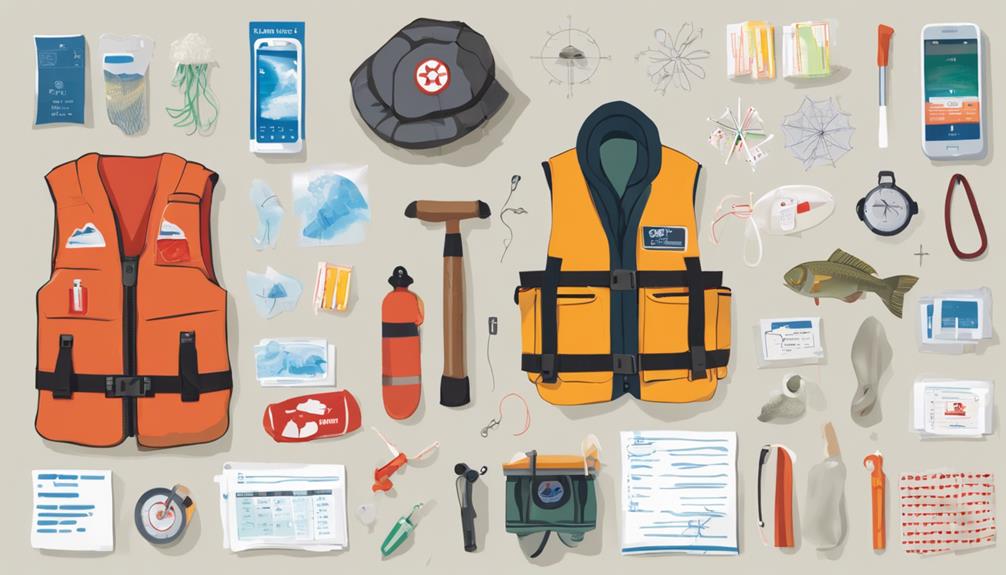
Regularly reviewing and updating your emergency preparedness plan is crucial for ensuring your safety while fishing. Being prepared for any unforeseen circumstances can make a significant difference in how emergencies are handled. Here are some key points to consider for your emergency preparedness while out fishing:
- First Aid Kit: Always have a well-stocked first aid kit on hand. Include items such as bandages, antiseptic wipes, gauze pads, adhesive tape, and basic medications.
- Emergency Contacts: Make sure you have a list of emergency contacts saved in your phone or written down. Include local emergency services, family or friends, and any relevant medical information.
- Communication Devices: Carry a fully charged cell phone or a marine radio for communication in case of emergencies. Signal flares or whistles can also be helpful for attracting attention.
- Emergency Response Plan: Have a clear plan of action in case of emergencies. Know what to do in situations such as someone falling overboard, getting injured, or encountering severe weather.
- Training: Consider taking a basic first aid and CPR course to be better prepared to handle emergencies. Knowing how to administer aid can be crucial in emergencies where every second counts.
Respect for Wildlife
When fishing, it's important to show respect for wildlife by understanding and following proper guidelines for interacting with the natural environment. Wildlife conservation should be at the forefront of your mind when engaging in fishing activities. By being mindful of the impact your actions can have on the ecosystem, you contribute to the preservation of our natural resources for future generations.
One crucial aspect of respecting wildlife while fishing is to observe and appreciate animal behavior. Take the time to learn about the different species that inhabit the area where you fish. Understanding their habits and behaviors can help you avoid disturbing their natural routines. For example, if you notice a nesting area nearby, it's best to keep your distance to avoid causing stress to the animals.
Moreover, practicing catch and release techniques can also play a significant role in wildlife conservation. By handling fish with care and releasing them back into the water properly, you contribute to maintaining fish populations and preserving the balance of the ecosystem. Remember, every action you take while fishing can either positively or negatively impact the wildlife around you. Showing respect for the environment and its inhabitants is essential for sustainable fishing practices.
Frequently Asked Questions
What Are Some Common Injuries That Can Occur While Fishing and How Can They Be Prevented?
When fishing, common injuries include cuts from hooks, slips, and sunburn. To prevent these, always wear proper safety gear like sturdy shoes and a hat.
Keep a first aid kit handy for any emergencies. Watch where you step to avoid falls and handle sharp objects cautiously. Apply sunscreen to prevent sunburn. Stay alert and take precautions to ensure a safe fishing experience.
Are There Any Specific Types of Fish That Should Be Avoided Due to Safety Concerns?
When it comes to fish consumption and safety concerns, it's important to be aware of potential risks.
Certain fish species may contain high mercury levels, which can be harmful if consumed in large quantities. Additionally, individuals with allergies should avoid specific types of fish that may trigger allergic reactions.
Being informed about these factors can help you make healthier choices when it comes to your diet and fishing practices.
How Often Should Fishing Gear Be Inspected and Maintained?
Regularly inspect and maintain your fishing gear to ensure safety and efficiency. Check for any signs of wear and tear after each use, and conduct a more thorough inspection at least once a month.
Proper maintenance techniques include rinsing gear with freshwater, drying it thoroughly, and storing it properly to prevent damage. By staying on top of inspections and maintenance, you can prolong the life of your gear and have a successful fishing experience.
Are There Any Potential Environmental Hazards to Be Aware of While Fishing?
When fishing, be aware of potential environmental hazards like water pollution. Practice eco-friendly methods to minimize your impact.
Consider wildlife conservation by adopting sustainable fishing practices. Help protect the environment by properly disposing of any waste and following regulations.
What Should Be Done in the Event of a Fishing-Related Emergency, Such as a Hook Injury or Getting Lost in the Wilderness?
If you face a fishing-related emergency like a hook injury or getting lost, remember to stay calm and assess the situation.
For a hook injury, first aid involves cleaning the wound and seeking medical help if needed.
In case of getting lost, use emergency procedures like signaling for help with a whistle or mirror, or following any safety protocols you have in place.
Stay prepared and act swiftly to ensure your safety in such situations.
Conclusion
Overall, following safe fishing practices is crucial for both your own safety and the well-being of the environment.
By ensuring you have the proper gear, understanding water conditions, practicing safe casting techniques, knowing local regulations, handling fish with care, protecting yourself from the sun, staying hydrated, being prepared for emergencies, and respecting wildlife, you can enjoy a successful and responsible fishing experience.
Remember, safety first!
